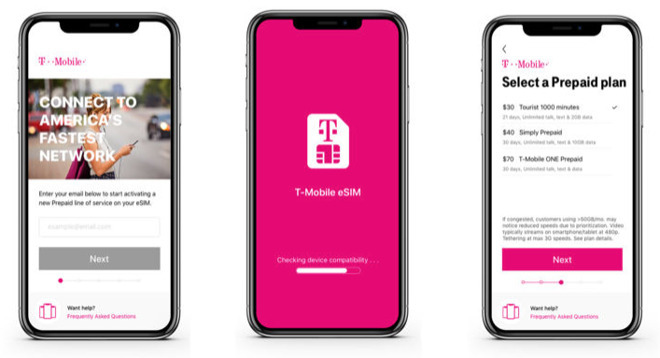The Federal Communications Commission has given the green light for the merger between T-Mobile and Sprint, with Wednesday's vote of approval for the joining of the two companies being one of the last hurdles needed to be cleared for the transaction to proceed.
The vote was split along party lines, with Chairman Ajit Pai and the two Republican commissioners approving the $26.5 billion deal while the pair of Democrat commissioners voted to deny the merger. The FCC is anticipated to release the text of the approval order before the end of this month.
The approval was first reported by Reuters, and marks the last approval needed to be granted by a US government regulator before it could proceed. The U.S. Department of Justice offered its approval of the merger in July, though with the added requirement the combined entity to support eSIM technology.
The two denouncing commissioners have already passed comment on the merger, with Commissioner Jessica Rosenworcel arguing in The Atlantic the deal will "only hurt consumers" with price surges and job losses. Rosenworcel highlights how mergers in a concentrated market lead to price gouging, such as baggage fees and smaller seats for airlines and the price rises of pharmaceuticals, suggesting "There's no reason to think the mobile phone industry will be different."
A similar story is offered by Commissioner Geoffrey Starks, accusing the majority voters of turning "to the parties for paper-thin commitments that they will expand broadband access and the deployment of 5G. But these promises cannot mask reality. You don't need to be an expert to know that going from four wireless carriers to three will hurt competition."
While the merger has passed practically all regulatory hurdles, it still has one more to go before it can proceed. A bipartisan lawsuit from 13 state attorneys general and the District of Columbia is needed to conclude for the merger to resolve.
The group of state attorneys are concerned the merger isn't the best deal for consumers, againt with issues over reduced competition in the marketplace. The effective turning of Dish Network into a potential fourth major carrier is also given a dim view by New York Attorney General Letitia James.
"The promises made by Dish and T-Mobile in this deal are the kinds of promises only robust competition can guarantee," The Verge reports James as claiming in July following the DOJ approval of the deal. "We have serious concerns that cobbling together this new fourth mobile player, with the government picking winners and losers, will not address the merger's harm to consumers, workers, and innovation."
 Malcolm Owen
Malcolm Owen







-m.jpg)






 Brian Patterson
Brian Patterson
 Charles Martin
Charles Martin



 William Gallagher
William Gallagher
 Christine McKee
Christine McKee
 Marko Zivkovic
Marko Zivkovic









24 Comments
Except that Sprint is not a significant driving force for lower prices. T-Mobile has been—first with separating device financing from mobile service, and then by pushing unlimited for a reasonable price. Sprint, like the other carriers, simply followed.
T-Mobile’s approach has been in response to Verizon, not Sprint. Losing Sprint as a separate carrier will not affect consumers’ wallets anytime soon and possibly never.
Though I dislike Sprint so I’m bugged by the merger with T-Mobile. But if the new entity continues the same approach as T-Mobile then I’ll have nothing legitimate to complain about.
We actually have six wireless networks in the US. C-Spire and US Cellular both operate independent networks, though they don’t have coverage in every state. The opposition claims we’ll be left with only 3 networks, which if true would still be enough to foster good competition, but there will actually be 5 instead of the current 6. As a T Mobile customer I am looking forward to this merger as it will likely drastically improve already greatly expanding coverage.
Good.
Since when are state attorneys concerned with giving us consumers the best deal? Were they all out on vacation when AT&T bought DirecTV?